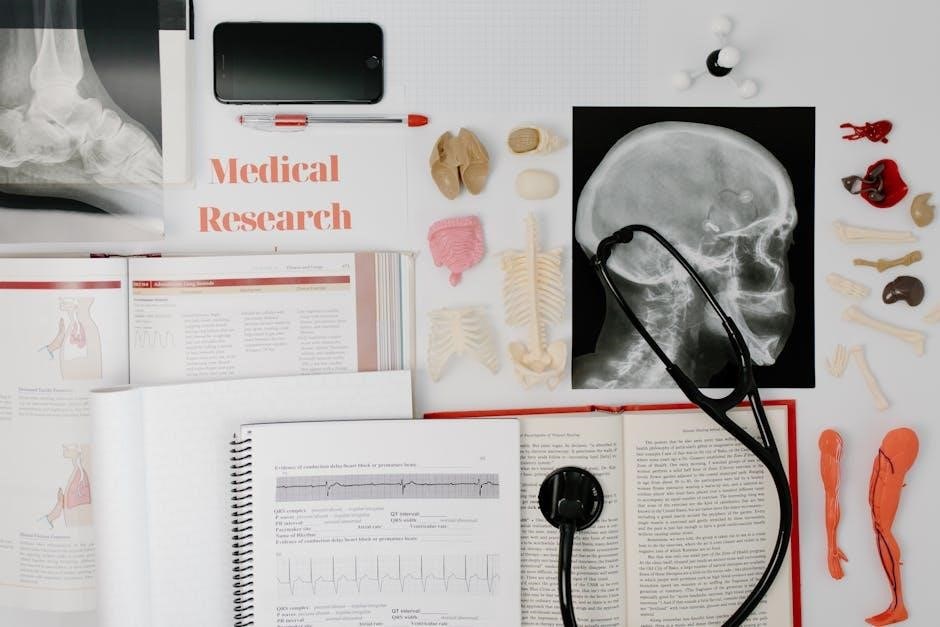A study guide is a valuable resource designed to help students organize and retain information effectively. It provides structured content, key concepts, and practical examples to enhance learning outcomes in chemistry.
What is a Study Guide?
A study guide is a comprehensive manual that outlines effective strategies for mastering a subject. It often includes summaries of key concepts, practical examples, and exercises tailored to specific learning objectives. Designed to enhance understanding and retention, study guides provide structured content to help students navigate complex topics systematically. They serve as valuable resources for both independent study and classroom preparation.
Why Use a Study Guide for Chemistry?
A study guide for chemistry offers a structured approach to mastering complex concepts, formulas, and reactions. It helps students identify knowledge gaps, organize information effectively, and practice problem-solving skills. By breaking down topics into digestible sections, study guides enhance understanding and retention, making learning more efficient. They also provide visual aids like diagrams and flowcharts, which are particularly useful for visual learners in chemistry.

Key Features of an Effective Study Guide
An effective study guide includes research-based strategies, targeted skill development, and empirical evidence to enhance learning. It organizes concepts clearly, making complex topics easy to understand and apply.
Research-Based Learning Strategies
Research-based learning strategies are essential for effective studying. Techniques like active recall, spaced repetition, and elaboration enhance retention. Active recall involves testing yourself regularly, while spaced repetition ensures consistent review over time. Elaboration connects new information to prior knowledge, deepening understanding. These evidence-backed methods, supported by educational research, create a structured approach to mastering chemistry concepts efficiently and effectively.
Targeted Skill Development
A chemistry study guide emphasizes targeted skill development, focusing on problem-solving, critical thinking, and laboratory techniques. It helps identify specific areas needing improvement, such as stoichiometry or chemical bonding. By breaking down complex concepts into manageable parts, students can build a strong foundation. Regular practice problems and real-world applications enhance practical understanding, ensuring skills are both relevant and applicable to future academic and professional challenges in chemistry.
Empirical Evidence in Learning Techniques
Empirical evidence plays a crucial role in shaping effective learning techniques within a chemistry study guide. Research-based strategies, such as active learning and spaced repetition, are proven to enhance retention and understanding. These methods are supported by educational psychology studies, ensuring that the techniques recommended are both practical and scientifically validated. By incorporating evidence-based approaches, students can adopt methods that have been consistently shown to improve academic performance in chemistry and related fields.

Creating Your Own Chemistry Study Guide
Creating your own chemistry study guide allows you to personalize your learning experience, addressing specific knowledge gaps and organizing concepts effectively for better retention and understanding.
Assessing Your Knowledge Gaps

Start by identifying areas where you need improvement through self-assessment or practice quizzes. Review past exams and homework to pinpoint weaknesses. Focus on understanding foundational concepts before moving to advanced topics. Use flashcards or concept maps to track progress and refine your study plan. Regularly testing yourself helps reveal gaps and ensures a well-rounded understanding of chemistry.
Organizing Concepts and Topics
Arrange chemistry concepts logically, starting with foundational topics like atomic structure and progressing to complex areas such as chemical reactions. Use hierarchical structures or mind maps to link related ideas. Grouping similar topics helps in building a coherent knowledge base. Regularly review and update your notes to ensure clarity and accessibility; This systematic approach fosters a deeper understanding and makes studying more efficient.
Integrating Practice Problems and Solutions
Incorporate practice problems and their solutions to reinforce understanding. Align problems with specific topics to apply theoretical knowledge practically. Detailed step-by-step solutions guide students through problem-solving processes. Regularly practicing these problems enhances critical thinking and prepares students for exams. This method bridges the gap between theory and application, ensuring mastery of chemistry concepts and problem-solving skills.

Active Learning Techniques for Chemistry
Engage with course materials actively, use flashcards for memorization, and participate in study groups to enhance understanding and retention of chemistry concepts through collaborative and interactive methods.
Engaging with Course Materials
Active engagement with course materials is crucial for mastering chemistry concepts. Regularly review notes, textbooks, and online resources to deepen understanding. Use techniques like annotating, summarizing, and applying concepts to problems. Leverage digital tools such as Study Fetch to transform notes into interactive study aids. Empirical evidence shows that consistent interaction with material enhances retention and problem-solving skills, making it a cornerstone of effective learning strategies in chemistry education.
Using Flashcards for Memorization
Flashcards are an excellent tool for memorizing chemistry terms and concepts. Platforms like Quizlet allow users to create and share flashcards, making studying interactive and accessible. By using active recall and spaced repetition, flashcards enhance retention. Digital tools like Study Fetch can transform notes into flashcards, quizzes, and tests with AI tutors, providing a comprehensive study experience. Regular use of flashcards improves understanding and recall, essential for chemistry exams.

Participating in Study Groups
Study groups foster collaborative learning, enabling students to share insights and clarify doubts. Platforms like Quizlet and Study Fetch support group sessions with flashcards and AI tools. Discussing concepts with peers enhances understanding and problem-solving skills. Sharing resources and explanations strengthens retention. Regular group study helps prepare for exams effectively, promoting active learning and engagement in chemistry.

Practice Problems and Study Tips
Practice problems and study tips enhance problem-solving skills and exam preparation. Utilizing resources like Quizlet and Chegg Study improves understanding and retention of chemistry concepts effectively.
Identifying Common Exam Questions
Identifying common exam questions helps focus study efforts on high-probability topics. Analyze past papers and course materials to recognize recurring themes. Utilize online platforms like Quizlet for flashcards and Chegg Study for guided solutions. Creating a dedicated section in your study guide for frequently asked questions ensures readiness and boosts confidence during exams. Regular review of these questions enhances problem-solving skills and time management strategies, leading to better academic performance in chemistry.
Mastering Problem-Solving Skills
Mastering problem-solving skills in chemistry requires consistent practice and strategic approaches. Break down complex problems into manageable steps, focusing on underlying concepts. Utilize online platforms like Quizlet for interactive exercises and Chegg Study for step-by-step solutions. Regularly reviewing practice problems and applying learned techniques enhances critical thinking and analytical abilities. Integrate self-questioning and time management strategies to improve efficiency and accuracy during exams, ensuring a deeper understanding of chemical principles.
Time Management Strategies
Effective time management is crucial for mastering chemistry. Create a structured study schedule, allocating specific time blocks for each topic. Prioritize challenging areas and break study sessions into manageable intervals. Use digital tools like timers and planners to stay organized. Regular breaks enhance focus and retention. Apply active learning techniques, such as solving problems within set times, to simulate exam conditions. This approach ensures efficient use of time and improved productivity.

Digital Resources for Chemistry Students
Utilize platforms like Quizlet for flashcards, Chegg Study for step-by-step solutions, and Khan Academy for free chemistry lessons. Tools like Study Fetch transform notes into AI-powered study aids.
Online Platforms for Learning
Platforms like Quizlet, Chegg Study, and Khan Academy offer interactive tools for chemistry students. Quizlet provides flashcards and practice tests, while Chegg Study offers step-by-step problem solutions. Khan Academy delivers free video lessons and practice exercises. Study Fetch converts notes into AI-powered flashcards and quizzes, enhancing study efficiency. These resources cater to diverse learning styles, making complex chemistry concepts more accessible and engaging for students.
AI Tools for Study Assistance
AI tools like Study Fetch transform study materials into interactive flashcards, quizzes, and tests with AI tutoring. These tools analyze content, create personalized study plans, and offer real-time feedback. AI-powered platforms help students identify knowledge gaps and improve problem-solving skills, making learning efficient and tailored to individual needs. They enhance traditional study methods, providing dynamic support for mastering complex chemistry concepts.

Accessing Study Guides and Notes
Study guides and notes are widely available on platforms like Quizlet, Studocu, and Chegg Study. These resources offer flashcards, practice problems, and detailed lecture notes. Students can access curated materials, share content, and collaborate with peers. Online libraries provide comprehensive support, ensuring easy access to high-quality study aids tailored to specific courses, helping students study more effectively and efficiently.
A well-structured study guide is essential for mastering chemistry. By using effective strategies and resources, students can achieve academic success and build a strong foundation in the subject.
Maximizing the Use of Your Study Guide
To maximize the effectiveness of your study guide, engage actively with the material. Regularly review and practice problems, ensuring you understand the solutions. Use flashcards for memorization and participate in study groups to clarify doubts. Incorporate digital tools and online resources for additional support. Consistent use of these strategies will enhance your learning outcomes and help you master chemistry concepts efficiently.
Continuous Improvement in Learning
Continuous improvement in learning involves setting specific goals and tracking progress; Regularly review and update your study guide to reflect new insights. Engage with course materials actively, and seek feedback to refine your understanding. Utilize digital tools and practice problems to reinforce concepts. By fostering a growth mindset and staying consistent, you can achieve steady progress and excel in chemistry.
